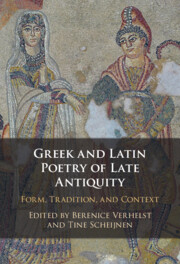Book contents
- Greek and Latin Poetry of Late Antiquity
- Greek and Latin Poetry of Late Antiquity
- Copyright page
- Contents
- Figures
- Contributors
- Introduction
- Part 1 A ‘Late’ Perspective on the Literary Tradition
- Part 2 Late Antique ‘Genres’ and ‘Genre’ in Late Antiquity
- Chapter 5 The Implosion of Poetic Genre in Late Antiquity
- Chapter 6 Common Texts, (Un)Common Aesthetics
- Chapter 7 A ‘Revival’ of the ‘Epyllion’ as a ‘Genre’?
- Part 3 The Context of Late Antiquity
- Bibliography
- General Subject Index
- Index Locorum
Chapter 7 - A ‘Revival’ of the ‘Epyllion’ as a ‘Genre’?
Genre Awareness in Short Epic Narrative from Late Antiquity
from Part 2 - Late Antique ‘Genres’ and ‘Genre’ in Late Antiquity
Published online by Cambridge University Press: 16 June 2022
- Greek and Latin Poetry of Late Antiquity
- Greek and Latin Poetry of Late Antiquity
- Copyright page
- Contents
- Figures
- Contributors
- Introduction
- Part 1 A ‘Late’ Perspective on the Literary Tradition
- Part 2 Late Antique ‘Genres’ and ‘Genre’ in Late Antiquity
- Chapter 5 The Implosion of Poetic Genre in Late Antiquity
- Chapter 6 Common Texts, (Un)Common Aesthetics
- Chapter 7 A ‘Revival’ of the ‘Epyllion’ as a ‘Genre’?
- Part 3 The Context of Late Antiquity
- Bibliography
- General Subject Index
- Index Locorum
Summary
This chapter focusses on a genre, which in recent scholarship has been unmasked as a modern invention: the ‘epyllion’. About the definition of this highly problematic term no consensus can be reached (metre? length? topic? structure?). Literary histories claim that the genre was born in the Hellenistic period and flourished again in Catullus’ time, with his Poem 64 as its main representative. Generally, they do not provide any examples of the ‘genre’ from Late Antiquity. And yet, one could argue in favour of a late antique ‘revival’, with both Latin (Dracontius, Reposianus, Ausonius, Aegritudo Perdicae) and Greek (Triphiodorus, Musaeus, Colluthus, Orphic Argonautica) representatives. This chapter looks at the ways these poems reflect genre awareness through an analysis of prefaces, prologues and other passages which stand out as (potentially) metapoetic. How do these late antique poems engage with their grand epic models? To what extent do they present themselves as a different (sub)genre and as traditional or innovative? Is the shortness thematised? If it was not a distinctive genre yet in Hellenistic times, did the epyllion, perhaps, become a genre in Late Antiquity?
Keywords
- Type
- Chapter
- Information
- Greek and Latin Poetry of Late AntiquityForm, Tradition, and Context, pp. 132 - 150Publisher: Cambridge University PressPrint publication year: 2022



